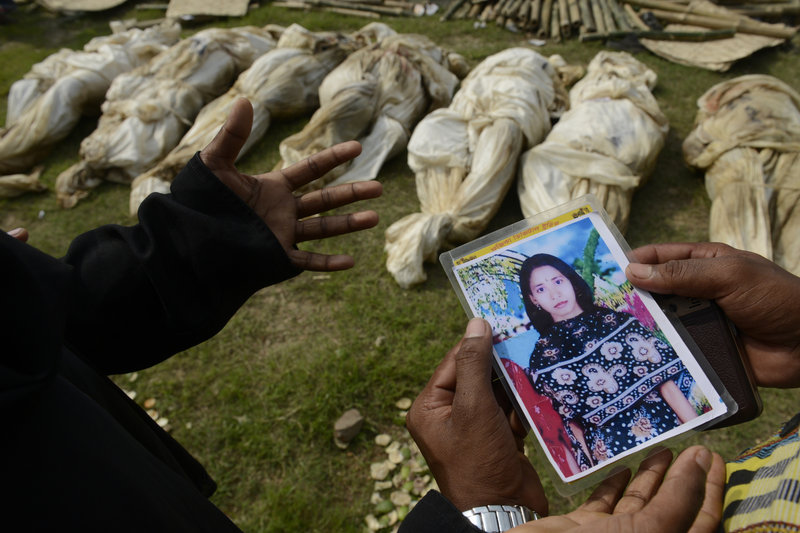JURAIN, Bangladesh – Dozens of Bangladeshi garment workers, their bodies too battered or decomposed to be identified, were buried in a mass funeral Wednesday, a week after the eight-story building they worked in toppled down, killing at least 410 people and injuring thousands.
Hundreds attended the traditional Muslim funeral and many more looked on from the roofs of nearby buildings as the bodies, rotting in the spring heat, were brought to the graveyard on the back of flatbed trucks.
Onlookers covered their noses. One woman rushed through the crowd to the back of a truck wailing that one of the bodies was her sister’s. She begged to take it as family members held on to her to keep her from collapsing.
Local men and boys recited a traditional Muslim prayer for the dead. Then, 34 bodies were unloaded and placed in the graves.
Workers at the cemetery have dug several long rows of graves as authorities expect to bury scores more unidentified bodies in the coming days.
“I would not have to take part in this if the government acted more responsibly,” said Rasel Islam, a 32-year-old man who attended the burial.
Five garment factories were housed in the illegally constructed Rana Plaza building that collapsed April 24, five months after a fire killed 112 people at another clothing factory. The tragedies exposed the unsafe conditions plaguing Bangladesh’s $20 billion-a-year garment industry, which supplies many European and American retailers.
At the Vatican, Pope Francis said he was shocked by a headline about the building collapse that said some of the workers were living on $50 a month.
“This was the payment of these people who have died … and this is called ‘slave labor,’ ” he said. Vatican Radio said the pope made the remarks during a private Mass at the Vatican.
“Not paying a just (wage), not providing work, focusing exclusively on the balance books, on financial statements, only looking at making personal profit. That goes against God!” Francis was quoted as saying.
He added: “People are less important than the things that give profit to those who have political, social, economic power. What point have we come to? To the point that we are not aware of this dignity of the person; this dignity of labor.”
EU officials said they are considering action including changes to Bangladesh’s duty-free and quota-free access to the giant EU market to “incentivize” responsible management of the nation’s garment industry. Catherine Ashton, the EU’s foreign affairs chief, and its trade commissioner, Karel De Gucht, called in a statement for Bangladesh authorities to act at once to ensure factories comply with international labor standards.
Send questions/comments to the editors.



Success. Please wait for the page to reload. If the page does not reload within 5 seconds, please refresh the page.
Enter your email and password to access comments.
Hi, to comment on stories you must . This profile is in addition to your subscription and website login.
Already have a commenting profile? .
Invalid username/password.
Please check your email to confirm and complete your registration.
Only subscribers are eligible to post comments. Please subscribe or login first for digital access. Here’s why.
Use the form below to reset your password. When you've submitted your account email, we will send an email with a reset code.